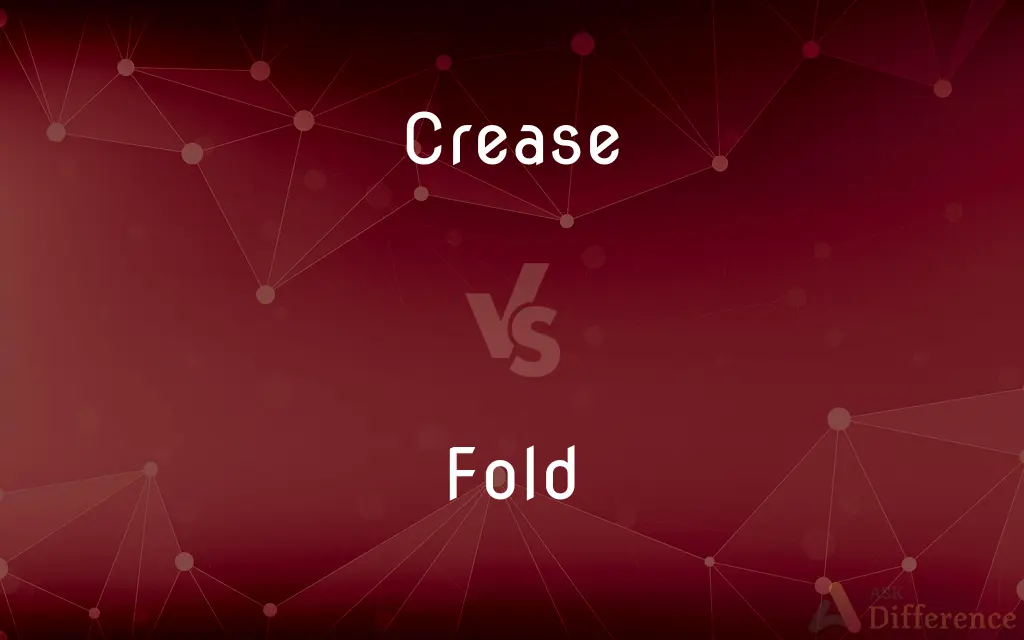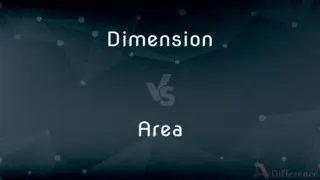Crease vs. Fold — What's the Difference?
By Urooj Arif & Fiza Rafique — Updated on March 9, 2024
Crease refers to a line made by pressing or crushing, while fold involves bending something, especially paper or fabric, so one part lies on another.

Difference Between Crease and Fold
Table of Contents
ADVERTISEMENT
Key Differences
Crease typically signifies a line or mark made on a surface as a result of pressing or crushing, often without intentionally dividing the material into distinct parts. Fold, however, involves bending a material, such as paper or fabric, so that one part of it lies flat against another, usually with the intention of creating a more compact shape or dividing the material into sections.
A crease can be accidental or intentional, such as a crease in a piece of paper that's been mishandled, or the creases ironed into trousers. A fold is usually deliberate, meant to organize, store, or alter the shape and structure of the material, like folding a letter to fit into an envelope or folding clothes for storage.
Creases can be temporary or permanent, depending on the material and the force applied. For example, a crease in a piece of fabric might be smoothed out with ironing, whereas a crease in leather could become a permanent feature. Folds often aim to be more permanent or are used in processes that modify the use or presentation of the item, such as folding paper into origami.
The process of creating a crease often requires less force and precision than a fold. A light press can result in a crease, while a fold typically involves a more deliberate action, aligning edges and creating a sharper delineation.
While both creases and folds alter the appearance and sometimes the function of materials, folds are generally associated with more functional purposes, such as organizing or shaping, whereas creases may be seen as flaws or, in some contexts, as elements of style.
ADVERTISEMENT
Comparison Chart
Definition
A line made by pressing or crushing a material
Bending something so one part lies on another
Intentionality
Can be accidental or intentional
Usually intentional
Permanence
Can be temporary or permanent
Often aims to be more permanent
Force & Precision
Requires less force and precision
Requires more deliberate action and precision
Purpose
Often seen as a flaw or a style element
Associated with organizing, storing, or shaping
Compare with Definitions
Crease
Imperfections from mishandling.
The poster had creases from being improperly stored.
Fold
Bending paper for insertion into an envelope.
She folded the letter neatly in three.
Crease
A line on paper from being folded or pressed.
The book's pages showed creases from frequent use.
Fold
Structuring materials for a purpose.
Folding a napkin into a decorative shape for table setting.
Crease
A mark indicating wear or use.
Creases on shoes can show their age.
Fold
Layering fabric for compact storage.
Folding clothes helps in organizing drawers.
Crease
Intentionally pressed lines for style.
The trousers had sharp creases down the front.
Fold
Creating shapes by bending material.
Folding origami requires precision.
Crease
A wrinkle on fabric from pressure.
His shirt had creases after being packed in a suitcase.
Fold
Dividing into parts by bending.
Folding a map makes it easier to handle.
Crease
A line made by pressing, folding, or wrinkling.
Fold
To bend over or double up so that one part lies on another part
Fold a sheet of paper.
Crease
In hockey, an area marked in front of the goal in which an offensive player can score a goal only if the puck reaches the area before the player does.
Fold
To make compact by doubling or bending over parts
Folded the laundry.
Folded the chairs for stacking.
Crease
In lacrosse, the circle marked around the goal into which offensive players cannot enter.
Fold
To bring from an extended to a closed position
The hawk folded its wings.
Crease
One of the lines in cricket marking off the positions of the bowler and batter or the space between two of these lines.
Fold
To bring from a compact to an extended position; unfold
Folded the ironing board down from the wall.
Folded out the map to see where we were.
Crease
To make a pressed, folded, or wrinkled line in.
Fold
To place together and intertwine
Fold one's arms.
Crease
To graze or wound superficially with a bullet.
Fold
To blend (a light ingredient) into a heavier mixture with a series of gentle turns
Folded the beaten egg whites into the batter.
Crease
To become wrinkled.
Fold
(Informal) To discontinue operating; close
They had to fold the company a year after they started it.
Crease
A line or mark made by folding or doubling any pliable substance; hence, a similar mark, however produced.
His pants had a nice sharp crease.
His shirt was brand new with visible creases from its store fold.
Fold
(Games) To withdraw (one's hand) in defeat, as by laying cards face down on a table.
Crease
(cricket) One of the white lines drawn on the pitch to show different areas of play; especially the popping crease, but also the bowling crease and the return crease.
Fold
(Geology) To form bends in (a stratum of rock).
Crease
(lacrosse) The circle around the goal, where no offensive players can go.
Fold
To become folded.
Crease
The goal crease; an area in front of each goal.
Fold
To be capable of being folded
A bed that folds for easy storage.
Crease
A crack.
Fold
(Informal) To close, especially for lack of financial success; fail.
Crease
(transitive) To make a crease in; to wrinkle.
Fold
(Games) To withdraw from a game in defeat.
Crease
(intransitive) To undergo creasing; to form wrinkles.
Fold
To give in; buckle
A team that never folded under pressure.
Crease
To laugh.
I can't breathe, I'm creasing so hard.
Fold
To weaken or collapse from exertion.
Crease
Archaic form of kris
Fold
To place or keep (sheep, for example) in a fenced enclosure.
Crease
See Creese.
Fold
The act or an instance of folding.
Crease
A line or mark made by folding or doubling any pliable substance; hence, a similar mark, however produced.
Fold
A part that has been folded over or against another
The loose folds of the drapery.
Clothes stacked in neat folds.
Crease
One of the lines serving to define the limits of the bowler and the striker.
Fold
A line or mark made by folding; a crease
Tore the paper carefully along the fold.
A headline that appeared above the fold.
Crease
The combination of four lines forming a rectangle inclosing either goal, or the inclosed space itself, within which no attacking player is allowed unless the ball is there; - called also goal crease.
Fold
A coil or bend, as of rope.
Crease
To make a crease or mark in, as by folding or doubling.
Creased, like dog's ears in a folio.
Fold
Chiefly British A hill or dale in undulating country.
Crease
An angular or rounded shape made by folding;
A fold in the napkin
A crease in his trousers
A plication on her blouse
A flexure of the colon
A bend of his elbow
Fold
(Geology) A bend in a stratum of rock.
Crease
A slight depression in the smoothness of a surface;
His face has many lines
Ironing gets rid of most wrinkles
Fold
(Anatomy) A crease or ridge apparently formed by folding, as of a membrane; a plica.
Crease
A Malayan dagger with a wavy blade
Fold
A fenced enclosure for livestock, especially sheep.
Crease
Make wrinkles or creases into a smooth surface;
The dress got wrinkled
Fold
A flock of sheep.
Crease
Make wrinkled or creased;
Furrow one's brow
Fold
A group of people or institutions bound together by common beliefs and aims.
Crease
Scrape gently;
Graze the skin
Fold
A religious congregation
The priest welcomed new parishioners into the fold.
Crease
Become wrinkled or crumpled or creased;
This fabric won't wrinkle
Fold
(transitive) To bend (any thin material, such as paper) over so that it comes in contact with itself.
Fold
(transitive) To make the proper arrangement (in a thin material) by bending.
If you fold the sheets, they'll fit more easily in the drawer.
Fold
(intransitive) To become folded; to form folds.
Cardboard doesn't fold very easily.
Fold
To fall over; to be crushed.
The chair folded under his enormous weight.
Fold
(transitive) To enclose within folded arms (see also enfold).
Fold
(intransitive) To give way on a point or in an argument.
Fold
To withdraw from betting.
With no hearts in the river and no chance to hit his straight, he folded.
Fold
To withdraw or quit in general.
Fold
To stir gently, with a folding action.
Fold the egg whites into the batter.
Fold
Of a company, to cease to trade.
The company folded after six quarters of negative growth.
Fold
To double or lay together, as the arms or the hands.
He folded his arms in defiance.
Fold
To cover or wrap up; to conceal.
Fold
To confine animals in a fold.
Fold
An act of folding.
Give the bedsheets a fold before putting them in the cupboard.
After two reraises in quick succession, John realised his best option was probably a fold.
Fold
A bend or crease.
Fold
Any correct move in origami.
Fold
(newspapers) The division between the top and bottom halves of a broadsheet: headlines above the fold will be readable in a newsstand display; usually the fold.
Fold
The division between the part of a web page visible in a web browser window without scrolling; usually the fold.
Fold
That which is folded together, or which enfolds or envelops; embrace.
Fold
(geology) The bending or curving of one or a stack of originally flat and planar surfaces, such as sedimentary strata, as a result of plastic (i.e. permanent) deformation.
Fold
(comptheory) In functional programming, any of a family of higher-order functions that process a data structure recursively to build up a value.
Fold
(programming) A section of source code that can be collapsed out of view in an editor to aid readability.
Fold
A pen or enclosure for sheep or other domestic animals.
Fold
(collective) A group of sheep or goats.
Fold
(figuratively) Home, family.
Fold
(Christianity) A church congregation, a group of people who adhere to a common faith and habitually attend a given church; the Christian church as a whole, the flock of Christ.
Fold
A group of people with shared ideas or goals or who live or work together.
Fold
The Earth; earth; land, country.
Fold
To lap or lay in plaits or folds; to lay one part over another part of; to double; as, to fold cloth; to fold a letter.
As a vesture shalt thou fold them up.
Fold
To double or lay together, as the arms or the hands; as, he folds his arms in despair.
Fold
To inclose within folds or plaitings; to envelop; to infold; to clasp; to embrace.
A face folded in sorrow.
We will descend and fold him in our arms.
Fold
To cover or wrap up; to conceal.
Nor fold my fault in cleanly coined excuses.
Fold
To become folded, plaited, or doubled; to close over another of the same kind; to double together; as, the leaves of the door fold.
Fold
To confine in a fold, as sheep.
Fold
To confine sheep in a fold.
The star that bids the shepherd fold.
Fold
A doubling,esp. of any flexible substance; a part laid over on another part; a plait; a plication.
Mummies . . . shrouded in a number of folds of linen.
Folds are most common in the rocks of mountainous regions.
Fold
Times or repetitions; - used with numerals, chiefly in composition, to denote multiplication or increase in a geometrical ratio, the doubling, tripling, etc., of anything; as, fourfold, four times, increased in a quadruple ratio, multiplied by four.
Fold
That which is folded together, or which infolds or envelops; embrace.
Shall from your neck unloose his amorous fold.
Fold
An inclosure for sheep; a sheep pen.
Leaps o'er the fence with ease into the fold.
Fold
A flock of sheep; figuratively, the Church or a church; as, Christ's fold.
There shall be one fold and one shepherd.
The very whitest lamb in all my fold.
Fold
A boundary; a limit.
Fold
An angular or rounded shape made by folding;
A fold in the napkin
A crease in his trousers
A plication on her blouse
A flexure of the colon
A bend of his elbow
Fold
A group of people who adhere to a common faith and habitually attend a given church
Fold
A folded part (as a fold of skin or muscle)
Fold
A pen for sheep
Fold
The act of folding;
He gave the napkins a double fold
Fold
Bend or lay so that one part covers the other;
Fold up the newspaper
Turn up your collar
Fold
Intertwine;
Fold one's hands, arms, or legs
Fold
Incorporate a food ingredient into a mixture by repeatedly turning it over without stirring or beating;
Fold the egg whites into the batter
Fold
Cease to operate or cause to cease operating;
The owners decided to move and to close the factory
My business closes every night at 8 P.M.
Fold
Confine in a fold, like sheep
Fold
Become folded or folded up;
The bed folds in a jiffy
Common Curiosities
How do you remove creases and folds?
Creases and folds can often be removed or lessened by ironing or steaming, depending on the material’s resilience and the depth of the crease or fold.
What does it mean to fold something?
To fold something means to bend it, often paper or fabric, so that one part of it lies flat against another, usually to create a more compact shape or to organize it.
Is a fold more permanent than a crease?
Folds are generally intended to be more permanent or functional, though both can vary in permanence depending on the material and treatment.
Can a crease become a fold?
A crease can lead to a fold if further pressure is applied to deepen the line and more deliberately divide the material into parts.
What is a crease?
A crease is a line or mark made on a material due to pressing or crushing, which can be either accidental or intentionally styled.
Can both creases and folds be intentional?
Yes, both can be intentional; creases can be added for style, such as in trousers, and folds are often made for functional purposes, like in origami.
How are creases and folds used in design?
In design, folds can create structure or transform shapes, while creases can add texture or emphasize certain elements.
Can creases add value to an item?
In some contexts, such as in well-worn leather goods, creases can add character and aesthetic appeal, potentially increasing value.
Why are creases considered flaws in some contexts?
Creases can be seen as flaws when they are unintentional and detract from the appearance of materials like clothing or formal documents, suggesting mishandling or carelessness.
How does the purpose of creases and folds differ?
Creases often result from pressure or wear, sometimes serving as style elements, while folds are predominantly used for organizing, shaping, or altering the function of materials.
Is it possible to fold something without creating a crease?
In most cases, folding something will create a crease due to the pressure applied, but the sharpness and permanence of the crease can vary based on the material and method.
Do creases always indicate damage?
Not necessarily; while creases can indicate wear or mishandling, they can also be intentionally made for aesthetic purposes or be a natural result of regular use.
Why is precision important in folding?
Precision in folding is crucial for achieving the desired outcome, especially in contexts like origami or when folding garments for display.
How can one avoid unwanted creases and folds?
Unwanted creases and folds can be avoided by careful handling, proper storage, and using tools like folders or clips to maintain material integrity.
What materials are commonly creased or folded?
Common materials include paper, fabric, and thin plastics, though many materials capable of bending without breaking can be creased or folded.
Share Your Discovery

Previous Comparison
Dimension vs. Area
Next Comparison
Anglicised vs. AnglicizedAuthor Spotlight
Written by
Urooj ArifUrooj is a skilled content writer at Ask Difference, known for her exceptional ability to simplify complex topics into engaging and informative content. With a passion for research and a flair for clear, concise writing, she consistently delivers articles that resonate with our diverse audience.
Co-written by
Fiza RafiqueFiza Rafique is a skilled content writer at AskDifference.com, where she meticulously refines and enhances written pieces. Drawing from her vast editorial expertise, Fiza ensures clarity, accuracy, and precision in every article. Passionate about language, she continually seeks to elevate the quality of content for readers worldwide.














































